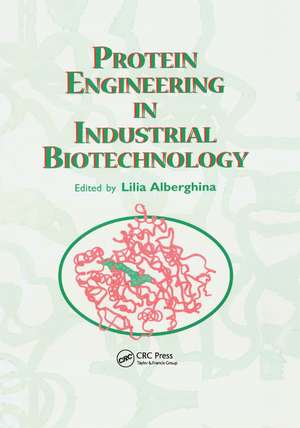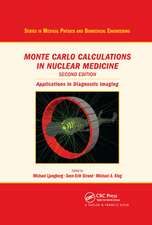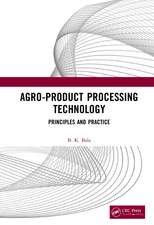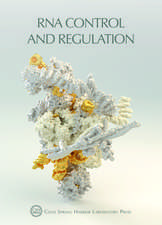Protein Engineering For Industrial Biotechnology
Editat de Lilia Alberghinaen Limba Engleză Paperback – 17 oct 2019
The application of protein engineering to health care is also covered, from the development of new vaccines to new potential therapeutic proteins. A specific notation is given to protein engineering in the development of target molecules for drug discovery.
International in scope, the many contributions are drawn from academia and industry. The text should be of interest to students and researchers in industrial biotechnology as well as to everybody interested in basic research in protein structure, molecular genetics, bio-organic chemistry, biochemistry, agrobiotechnology, pharmaceutical sciences and medicine.
| Toate formatele și edițiile | Preț | Express |
|---|---|---|
| Paperback (1) | 489.26 lei 43-57 zile | |
| CRC Press – 17 oct 2019 | 489.26 lei 43-57 zile | |
| Hardback (1) | 1668.93 lei 43-57 zile | |
| CRC Press – 10 ian 2000 | 1668.93 lei 43-57 zile |
Preț: 489.26 lei
Preț vechi: 575.60 lei
-15% Nou
Puncte Express: 734
Preț estimativ în valută:
93.62€ • 98.01$ • 77.46£
93.62€ • 98.01$ • 77.46£
Carte tipărită la comandă
Livrare economică 07-21 aprilie
Preluare comenzi: 021 569.72.76
Specificații
ISBN-13: 9780367398972
ISBN-10: 0367398974
Pagini: 396
Dimensiuni: 178 x 254 x 23 mm
Greutate: 0.45 kg
Ediția:1
Editura: CRC Press
Colecția CRC Press
ISBN-10: 0367398974
Pagini: 396
Dimensiuni: 178 x 254 x 23 mm
Greutate: 0.45 kg
Ediția:1
Editura: CRC Press
Colecția CRC Press
Public țintă
Professional ReferenceCuprins
1. Protein Engineering in Basic and Applied Biotechnology: A Review 2. Enhanced Recovery and Folding of Recombinant Proteins Using Fusion Protein Strategies 3. Protein Engineering for Affinity Purification: The Strep-tag 4. Candida rugosa Lipases: From Molecular Evolution Analysis to the Design of a Synthetic Gene 5. Structure-Function Studies on Cutinase, a Small Lipolytic Enzyme with a Water Accessible Active Site 6. Lipases from rhizopus Species: Genetics, Structure and Applications 7. Solvent Engineering Modulates Stereoselectivity of Microbial Lipases 8. Stabilization of Industrial Enzymes by Protein Engineering 9. Design of Biotechnologically Applicable Yeast Carboxypeptidase Y Mutants with Increased Preference for Charged P1 Residues 10. Engineering ß-Glycoside Hydrolases 11. Engineering Specificity and Stability in Glucoamylase from Aspergillus Niger 12. Pectin Modifying Enzymes and Designer Pectins 13. Engineering Proteins for the Degradation of Recalcitrant Compounds 14. Protein Engineering for Biosensors 15. Protein Engineering in Vaccine Development 16. Exploring Molecular Recognition by Combinatorial and Rational Approaches 17. Production and Potential Applications of Recombinant Gastric Lipasis in Biotechnology 18. Inhibition of Ras-Dependent Signal Transduction for Therapeutic Purposes: Protein Engineering of a Ras-Specific Guanine Nucleotide Exchange Factor 19. Expression and Use of Tagged Cells Surface Receptors for Drug Discovery 20. Estrogen Receptor as a Target for New Drug Discovery 21. Molecular Bioscreening in Oncology
Descriere
This book presents examples in which the application of protein engineering has successfully solved problems arising in industrial biotechnology. It offers extensive coverage of the use of protein engineering to modify the activity or the stability of industrial enzymes from lipases to proteases, from carboxypeptidases to glucanases and glucosidases, and from pectin modifying enzymes to enzymes able to degrade recalcitrant compounds. It also explains how areas as diverse as agrofood technology, fine chemistry, detergents, bioremediation and biosensors receive significant contributions from protein and solvent engineering.






















